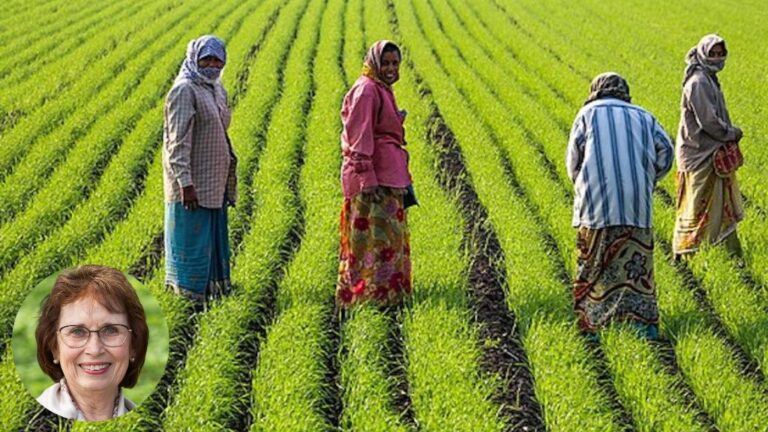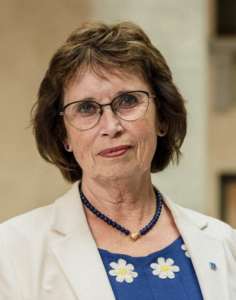Standing up for the one percent goal, women's education and poverty reduction are some of several attributes that characterize the Christian Democrats' development aid policy. With democracy as the highest guarantor of peace, values such as human rights must be defended in the world through Swedish development assistance. It writes Gudrun Brunegård, bdevelopment policy spokesperson within the Christian Democrats.
That aid to the Christian Democrats is a matter of the heart, part of the party's DNA, is not a phrase. On the contrary, it is based on the fundamental principles of the party: the unique and inviolable value of every human being, the solidarity and responsibility of our fellow human beings and the stewardship of our common resources. We also cherish the power that exists in the natural communities of civil society - in associations, trade unions and voluntary organizations.
The Christian Democrats stand up for the one percent goal. Sweden must have an ambitious development policy with generous and effective aid. In a world with almost endless needs, joint efforts are required. Then it is reasonable that the level of development assistance is set on the basis of a decision in principle and not needs-tested on an ongoing basis.
Democracy and human rights must be the starting point and goal for Swedish development policy.
Humanitarian aid to countries that have just experienced a natural disaster, for example, must reach out to those in need. Humanitarian efforts led by locally active organizations have proven to be most effective and contribute to a greater extent to strengthening women's rights than other efforts.
Joint efforts are needed as long as people are forced to live under freedom and oppression or suffer from poverty, hunger and serious diseases. Access to health care, education, democracy, economic freedom and the rule of law make it possible for more people to rise from poverty and hope for a better future.
The long-term goal of development assistance must be for the countries that currently receive development assistance to reach a development where development assistance is no longer needed. Development support must primarily be channeled through civil society and the private sector. Unfortunately, civil society's share of Swedish development assistance has decreased in relation to other sectors. That must change!
After a two-year pandemic, the world has a situation where development has declined for twenty years. More people are starving, more girls have been taken out of school, married off and having children, more countries have used the pandemic to make serious restrictions on civil liberties and rights. 2020 was the first year in a 22-year period where the number of people in extreme poverty increased, according to the World Bank. According to the UN, more than 700 million people live in extreme poverty, an increase of about 100 million people since the start of the pandemic. The children are hardest hit.
In addition, there are the effects of Russia's war of aggression against Ukraine in international law. In addition to the great humanitarian needs that arise in the wake of the war, Ukraine is one of the world's largest food producers. The war will lead to a sharp reduction in access to grain and cooking oil. In Yemen, the UN food program was forced to withdraw food aid eight million people.
The fact that the Social Democratic government in this situation has decided that parts of the development assistance should be used in Sweden gives completely wrong signals about what international solidarity means. In addition, when the cuts are to be made during the current financial year, there is no opportunity to redistribute to mitigate the negative consequences. Aid organizations describe how the cuts will exacerbate humanitarian disasters in Ukraine, Yemen, Syria and other countries. It will also affect support for civil society organizations, human rights defenders and environmental activists.
All this risks making an insecure world even more insecure and forcing even more people to flee because of famine, but also because of the shrinking democratic space that will result if our support suddenly fails. To make these cuts through a regulation letter to Sida, so that we can not even ask the question for a decision in the Riksdag chamber, is frankly cowardly by the Social Democratic government.
Poverty reduction must be a priority in Swedish development assistance. The goal should be to lift more people and communities out of poverty every year without creating dependence on support from the outside world.
Strengthening democracy and increasing respect for human rights and freedoms must be central goals for Swedish development assistance. Sweden must support democracy fighters and work for strengthened freedom of expression and freedom of thought in countries where it is restricted. Democracy is the best guarantor of peace and security and a prerequisite for an inclusive development where everyone, regardless of age, gender, ethnicity, religion or other identity, can enjoy their freedoms and rights. Only with lasting and stable democracy as a basis can social and economic development gain a lasting foothold in societies. Democracy and human rights should therefore be an overriding principle for Swedish foreign policy.
The right of girls and women to education and health must be one of the highest priorities in Swedish development policy. Women and children in the poorest countries are hardest hit by climate change. Development aid policy must also be permeated by a strong child rights perspective. Children are often worst affected by poverty, war, climate change and disasters. By investing in the younger generation, for example through investments in schools and health, development assistance can lay the foundation for a more long-term positive change in the level of welfare in poor countries.
People in rural areas, who depend on their agriculture and local natural resources for their survival, are often more vulnerable to droughts, floods and other weather-related natural disasters. Small funds for preventive purposes save multiple sums in disaster response. The Christian Democrats want to increase support for climate adaptation and disaster prevention measures. One way is for a larger share of development assistance to be allocated to strengthening cooperatives and small-scale agriculture in low-income countries. Female farmers, who make up a majority of the world's poor, are important entrepreneurs in securing everyone's right to food.
The Christian Democrats are now in the process of developing a reform agenda for continued generous and even more effective and sustainable aid - with the vulnerable people at the center.
The Riksdag parties' view of Swedish development cooperation
Utvecklingsmagasinet has contacted all eight parliamentary parties and offered them to write debate articles about their views on Swedish development cooperation - how they view the one percent goal and how they want development cooperation to look in the future. The articles and any replicas will be published on an ongoing basis www.fuf.se/magasin.


